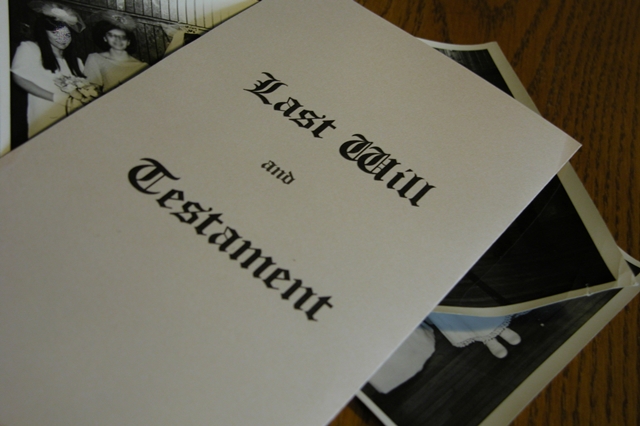Team Estrogen Needs to Plan Now for Now … and Then

For my male readers, I’m shouting one out for the estrogen team, today. You\’re more than welcomed to stay and share this post with the hub of your life, but I’ll return to the neutral zone with the next post. Recently, I shared a number of articles via Twitter and LinkedIn about the supposed trepidation women have when it comes to estate planning, particularly managing their financial affairs. As a female lawyer in a practice area traditionally held by men, I must admit those articles ruffled my feathers. I contend that women are not afraid of talking about money or estate planning matters, we often just don’t think we have the time. The role of the female is still that of the family hub– mother, daughter, spouse, partner, sister. Being the family hub requires a great deal of time and effort. Add to that our occupational responsibilities and community obligations and it’s perfectly understandable why we focus on the “now” and not the “then.” Yes, we are fully aware of the fact that if we take some time now, we could make “then” better. However, as a single parent when: a presentation to a major client is due on Monday, the kids have to be taken to gymnastics and birthday parties and Sunday school, Mom needs help with her new ottoman, Sis wants a review of the web site of your annual “sisterhood vacation” hotel, as chair of the silent auction committee you have to complete the donations list by Friday night, and you still have to exercise, cook, and pick up the cleaning (housekeeper not in the budget), “converting my 401(k) into …” doesn’t really make it to the top of the list. Next, is the fact that we know we’re the hub and the emotional gravity accompanying that realization. I don’t know too many women who readily give thought to when they won’t be around to see their grandchildren, nieces’ weddings, or best friend’s daughter’s college graduation. It is a very painful and counterintuitive thought for women. Fear has little to do with it. We simply love our families and friends and cannot fathom not being there for them. Nevertheless, Ladies, as painful, counterintuitive, and time consuming as it may be, we owe it to our families and ourselves to sacrifice a manicure, to miss a committee meeting, to reschedule a conference call, to say a prayer and let Sis choose the hotel, so we can take care of “now” and “then” now. The list of reasons for doing this is not exhaustive and are compelling: Your retirement savings may be dwindling unnecessarily; Your widowed father living a few states away may have a new BFF with less than charitable thoughts about Dad’s annuity; An in-state college may not afford your son the best educational opportunity for his mechanical engineering career; You might be able to withdraw income now from grandma’s IRA (progressive grandma!); Your current income may be beneficial for a retirement vehicle that may not be as readily available when your income rises past a certain point; You may want to go on sabbatical but, who’s going to mind the store, literally; Instead of a place where Mom will be bored silly playing checkers, you may want to send her cruising 6 months a year; and You want your partner to be able to visit you immediately after major surgery. Minding our retirement and estate matters now actually makes us, the family hub, stronger. If you want, I’ll take notes at your next committee meeting, so you can meet with a reputable CFP.
5 Reasons Why a Will Might Be for You

Generally, I advise clients that trusts are more appropriate, especially if the client wants his or her heirs or beneficiaries to avoid probate. Preventing an estate from going through probate is beneficial if the estate is sizable, i.e., consists of a house, life insurance, a retirement plan or securities, one or more automobiles, and furnishings. However, there are circumstances when a will may be more appropriate: If there is no will, then the property might be distributed to, or in proportions, someone unintended by the decedent. For example, your spouse might only receive 1/3 of the estate’s personal and real property and the remaining 2/3 will go to a child or relative who kicked your dog. Equally egregious is that the property could be distributed to the state, which may have already benefited from receiving several years of income and sales taxes from you. If the estate is modest, for example $100,000 – $200,000, avoiding probate is even more reasonable and it may be possible to waive a probate hearing, so a trust under these circumstances is probably unwarranted. A grantor may not want to designate a trustee and may not want to be a trustee during his or her lifetime.* So, by using a will, a sizable estate will go through probate but each legatee will ultimately be responsible for the preservation and enrichment – or diminution – of his or her own gift. If the testator has minor children and doesn’t want the court to determine guardianship in the event of death or incapacity, then a will can nominate who should be the guardian. A grantor with no desire to continually update a trust document may use a pour-over will, a simple mechanism by which all of the estate is designated to a trust. Okay, so this one is a compromise betwixt the 2 but \”4 1/2 Reasons…\” just didn\’t flow. * A settlor, also referred to as a “grantor,” is the individual who creates the trust.

